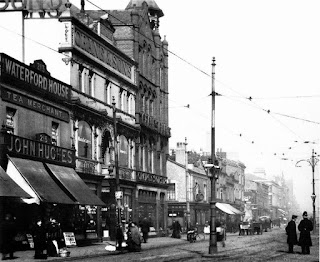A man who beat his mother to death as a twelve year old lodger was watching was convicted of murder but had his death sentence commuted to life imprisonment.
In 1866 Owen McCormick was living with his 65 year old widowed mother Catherine in Thurlow Street off Scotland Road. In the early hours of 19th June that year 29 year old McCormick was in a drunken state in the downstairs of their home, leading to Catherine coming down to check he was ok.
When woken by Catherine, McCormick punched her and stamped on her, pulled her hair and hit her with a poker. He then picked up a boot and started hitting her about the head with the heel of it until it broke. This brutal assault took place in front of 12 year old Mary Hunt, the child of a couple who lodged there.
Mary screamed at McCormick to stop but he threatened her too and she went upstairs, saying nothing to her parents. When daybreak came, she told her father what had happened and he went down and found Catherine in an insensible state. When her condition didn't improve a doctor was called and he discovered four wounds which had cut to the bone as well as serious bruising.
 When he was taken to the Bridewell on a charge of violent assault McCormick told the police officer that he was 'mad drunk at the time' and knew nothing about what had happened.After Catherine died on 22nd June, a post mortem showed that her internal organs were healthy and death had resulted as a consequence of the injuries to her brain. McCormick was then committed to the assizes on a coroner's warrant after the inquest returned a verdict of wilful murder.
When he was taken to the Bridewell on a charge of violent assault McCormick told the police officer that he was 'mad drunk at the time' and knew nothing about what had happened.After Catherine died on 22nd June, a post mortem showed that her internal organs were healthy and death had resulted as a consequence of the injuries to her brain. McCormick was then committed to the assizes on a coroner's warrant after the inquest returned a verdict of wilful murder.
The trial at the assizes took place on 10th August, with the doctor who attended stating that Catherine's injuries were consistent with the beating that Mary had described. The best that the defence could come up with was that the evidence of a 12 year old could not be relied upon to send a man to the gallows.
In summing up the judge said how once again drink was a factor and that he was surprised how people took drink when they had no control of their actions when under its influence. He directed to the jury that if they were satisfied the evidence provided was the truth, then they had to find McCormick guilty of murder. It took them just a few minutes to return a guilty verdict, but with a strong recommendation for mercy.
When asked why sentence of death should not be passed, McCormick protested his innocence and said that he had gone to bed on the evening of the 18th June after drinking some port, then got up at 630am to find his mother in the state she was in. Baron Martin though had no doubt that the right verdict had been reached and told him prior to donning the black cap: 'The verdict was one that no jury who intended to do their duty could avoid giving. I have no doubt that everything that the girl stated was the truth. It is my firm belief that there was not one word stated by that girl that was not true.'
After the death sentence was passed McCormick cried mournfully and had to be carried to he cells by two turnkeys. However the full sentence of the law was not passed as on 30th August the Home Secretary Spencer Walpole confirmed that he would instead be imprisoned for life.


No comments:
Post a Comment